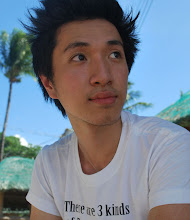A great scholar told me, "life is too short for bad things." And yes, these simple words are of great importance. Its simplicity makes it a structure of greater implications. The word "things" does not only signify things that can be held in one's hand, but it can be generalized to bigger and more abstract endeavors. Perhaps, I will create a list on the things that may not make life worthwhile.
Life is too short...
1. to read critics of a lesser value. Would you compare the words of Soledad Reyes and Gemino Abad to Michel Foucault and W. Said? You do the math and put their works and words side-by-side.
2. for bad coffee. Coffee should be a perfect blend between the sweet and the bitter, the hot and the cold, and you and me. Now, would you consume coffee that makes you barf and makes you regret consuming it?
3. for being a specialist. Being a specialist will make your life miserable. Why not try to become a generalist and expose yourself to the "things" that you really want the most.
4. for bad company. Hating is easy, but getting the right people to be with is not without difficulty.
5. to be bitter. As I've said, bitterness is the religion of the insecure.
6. for unhappy thoughts. If you don't understand this, you have an IQ of less than 50.
7. to not take a chance. Example, tell the person that you like him or her. Life is not worth living with regrets. By not doing so, you will be haunted by the "I should have done that" cliche.
8. to deal with people who are stupid and wanting political correctness. I never cared for political correctness. Our main responsibility should be professional and practical correctness. If you want to spark change, resign from your job and join an NGO. If not, then stop whining about wanting to spark a change.
9. to not do things for the love of it. Simply put, do anything and everything for the love of it. Always say, I want to do this for the love of it.
These are just some of the things that I've seen in retrospect. The list will grow in the days to come.
Saturday, February 19, 2011
Rub Your Language Against Mine
Language is a skin: I rub my language against the other. It is as if I had words instead of fingers, or fingers at the tip of my words. My language trembles with desire. The emotion derives from a double contact: on the one hand, a whole activity of discourse discreetly, indirectly focuses upon a single signified, which is "I desire you," and releases, nourishes, ramifies it to the point of explosion (language experiences orgasm upon touching itself); on the other hand, I enwrap the other in my words, I caress, brush against, talk up this contact, I extend myself to make the commentary to which I submit the relation endure.
(taken from Roland Barthes' A Lover's Discourse: Fragments)
___________________________________________________
Rub your language on me, and make me feel your words.
Labels:
A Lover's Discourse,
Barthes,
Language,
Roland
Barthes as an Educator Educating other Educators on how to Educate
According to Roland Barthes, there are three major phases in the life of a professor.
First, teaching what "I" know. "I" referring to the professor.
Second, teaching what "I" don't know, pertaining to research.
Third, the process of unlearning what was been learned. Though this phase contains little knowledge; it, however, presents much flavor in one's life.
(Taken from A Barthes Reader, 1982)
Unfortunately, most of the professors I've met have not reached the third and most important phase.
____________________________________________________
For those who do not know who Barthes is and think that the name is a brand of a detergent, here's a bit of an introduction. Roland Barthes is a French theories, critic, philosopher and, semiotician. If you still don't get the big picture, google him.
First, teaching what "I" know. "I" referring to the professor.
Second, teaching what "I" don't know, pertaining to research.
Third, the process of unlearning what was been learned. Though this phase contains little knowledge; it, however, presents much flavor in one's life.
(Taken from A Barthes Reader, 1982)
Unfortunately, most of the professors I've met have not reached the third and most important phase.
____________________________________________________
For those who do not know who Barthes is and think that the name is a brand of a detergent, here's a bit of an introduction. Roland Barthes is a French theories, critic, philosopher and, semiotician. If you still don't get the big picture, google him.
Labels:
Barthes,
Lover's Discourse,
Reader,
Roland
Subscribe to:
Posts (Atom)


